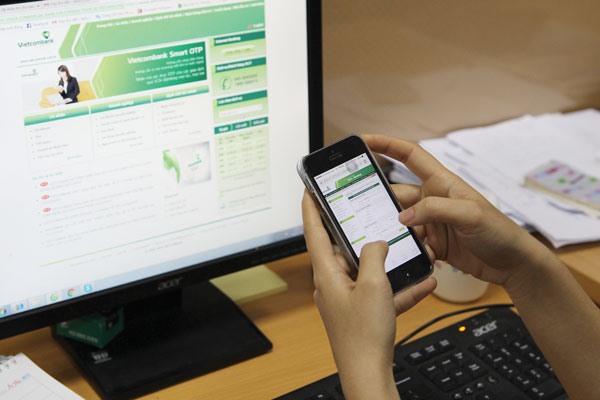 Economy
Economy

Nguyễn Thanh Trúc in District 1 has just paid her monthly electricity bills via internet banking.
 |
| More and more Vietnamese consumers are turning to computers, smartphones and tablets to do business with their banks. — VNS Photo |
HCM CITY — Nguyễn Thanh Trúc in District 1 has just paid her monthly electricity bills via internet banking.
“I have used the service for more than one year. This is a very convenient service and helps me save time from going to electricity bill collection points,” she said.
In fact, more and more Vietnamese consumers are turning to computers, smartphones and tablets to do business with their banks. They have opted to make deposits online or online payments of electricity and water bills and even buy gold on their smartphones, according to experts.
There is huge potential to develop digital banking in Việt Nam.
According to a report discussed at a workshop held recently in HCM City, Việt Nam posts an internet growth rate of 9 per cent a year, ranking 15th in the world. The number of internet users accounts for 52 per cent of the country’s population.
About 44 per cent of customers at commercial banks have used digital services.
The fourth industrial revolution and Government policy to encourage credit card payment instead of cash have enlarged digital banking potential in the country.
In the past, along with growth in internet and mobile device use, commercial banks in Việt Nam have been expanding and developing internet banking on mobile devices to offer better services to customers.
To attract customers to use the Internet and mobile banking services, banks have launched promotions.
LienVietPostBank, for instance, discounts 30 per cent of the transaction value to customers who pay bills for TV services or discounts VNĐ20,000 to customers who pay electricity or water bills using Ví Việt app until January 31.
Similarity, at Viet Capital Bank, customers using the Payoo app to pay their TV bills of HanoiCab and MyTV Cần Thơ will be given back 30 per cent of the transaction value until January 31.
Many banks, including VietinBank and VPBank, are offering bonus interest rates to customers who make online deposits.
Banking finance expert Cấn Văn Lực said technology is the key to shorten the distance between banks and customers as well as help save big costs compared to traditional transaction methods.
"Banks themselves also understand that if they do not invest in digital technology, they will be left behind. Customers today can actively perform transactions anytime, anywhere, via computer or smartphone with all types of products and services that they can conduct at a traditional banking branch," Lực said.
A general director of a joint stock bank, who did not want to be named, said: “A digital banking project can cost some millions of US dollars, but in the long-term, this investment is still cheaper than expanding branch networks.”
Faster, more convenient and more secure electronic payment transactions were the targets that commercial banks were aiming for in the digital banking competition, he said.
Lực said digital banking was certainly going to be a new way of banking for all banks.
Transactions using digital technology would contribute 40 per cent of banking revenue in 2018, up 32 per cent compared to 2014, he said.
"One of the factors in developing digital banking is to build trust and confidence among consumers about the security of online transactions," he added.
Online shopping boom
Online shopping has been popular worldwide and Việt Nam is keeping up with the trend thanks to its active Internet use, according to a recent KPMG International’s survey.
Chong Kwang Puay, managing partner and consumer markets lead of KPMG in Việt Nam and Cambodia, said with its high Internet penetration rate, Việt Nam would see online shopping surge soon.
According to the survey, 18 per cent of consumers in Việt Nam and Cambodia purchased goods from an online-only retailer, such as Amazon, Lazada and Nhommua. Some 10 per cent purchased from the website of a retail shop, and only 3 per cent purchased directly from a manufacturer or brand’s website.
The number one reason consumers gave for shopping online is the convenience of shopping. This is followed by having the ability to compare prices, or to find online sales or better deals.
To gain consumer trust, companies and brands are recommended to improve online security and privacy protection. Most respondents (26.5 per cent) consider customer data and information protection to be of utmost importance, and 20.4 per cent consider food and product safety as the most important attributes. — VNS




